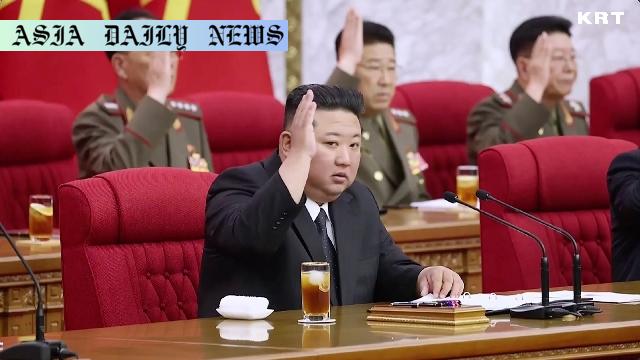Workers’ Party Congress: North Korea announces the decision to convene its Ninth Congress, highlighting key defense and political plans.
North Korea announces plans to convene its Ninth Workers’ Party Congress.
The last congress in 2021 unveiled a five-year defense strategy.
Kim Jong Un delivered an undisclosed speech following a plenary session.
State media emphasized the congress’s unanimous decision and strategic importance.
Unclear if recent warship failure or defense updates will feature prominently.

North Korea: A Strategic Step Forward with the Ninth Workers’ Party Congress
North Korea recently announced its decision to convene the Ninth Congress of its ruling Workers’ Party, marking a pivotal moment in its strategic and political trajectory. The Congress, regarded as the party’s supreme decision-making body, last convened in January 2021. During the prior meeting, leader Kim Jong Un was confirmed as party general secretary, and ambitions for an advanced defense strategy emerged. The revival of this congress may shed light on significant matters related to domestic and international affairs, particularly amid North Korea’s complexities in maintaining its defense programs and managing political stability.
What the Ninth Workers’ Party Congress Implies
The Ninth Congress carries great importance in North Korea’s political calendar. During the three-day plenary meeting concluding recently, this decision received unanimous backing from the central committee, signaling the regime’s intent to portray internal unity and resolve publicly. While no specific date has been disclosed for the congress, preparations are reported to be underway to ensure its success. These deliberations could further reveal shifts in the country’s ideological narrative, fueled by the combination of Kim Jong Un’s leadership goals and evolving geopolitical challenges.
The Defense Agenda: Highlight from Previous Congress
The 2021 congress unveiled a five-year defense strategy, with the aim of modernizing military technology, particularly enhancing intercontinental ballistic missile (ICBM) capabilities and miniaturizing nuclear weapons. Despite recent setbacks, including the failed launch of a new warship in May of this year, North Korea appears steadfast in underscoring its military ambitions. Notably, the latest plenary meeting failed to disclose whether these topics were revisited or revised following prior declarations.
Unanswered Questions and Anticipated Outcomes
Kim Jong Un’s latest address during the plenary meeting remains shrouded in mystery, leaving analysts to speculate on its content. Was it a review of past failures or a prelude to new developments? Notably, speculation also swirls around how North Korea will handle economic challenges, foreign relations, and sanctions imposed by international powers. The congress could serve as an opportune platform to address key areas, including economic resilience amidst sanctions, military advancements, and efforts to consolidate power within the ruling elite.
A Look Back: The Congress’s Historical Role
Historically, the Workers’ Party Congress has played a vital role in presenting key policies, affirming leadership positions, and mobilizing nationalistic sentiment. The congress ensures allegiance to Kim Jong Un’s larger vision for a unified and more militarily influential North Korea. Its proceedings, often symbolically charged, provide a sense of strategic direction—both domestically and to external observers.
Concluding Thoughts
As preparations for the Ninth Congress forge ahead, North Korea is poised to make headlines once again. With defense strategy, economic resilience, and public ideology likely to be central themes, the congress will shed light on how North Korea seeks to position itself on the global stage. The role of Kim Jong Un’s leadership will undoubtedly remain a focal point as he addresses perceived challenges and opportunities facing the nation. Observers will closely monitor the outcome of this congress to discern North Korea’s upcoming moves.



Commentary
The Ninth Congress: A Window Into North Korea’s Strategy
The convening of North Korea’s Ninth Workers’ Party Congress offers not just an internal glimpse into the country’s governance but also an indication of its intended signal to the world. These congress gatherings are highly orchestrated displays aimed at reinforcing the leadership and consolidating policy approaches. While the decision to host the congress was publicly endorsed unanimously, it is clear that this display of harmony in public does not necessarily mean internal dissent does not exist.
What to Expect in a Shifting Geopolitical Climate
The geopolitical atmosphere surrounding this congress cannot be overlooked. With sanctions imposed on North Korea and rising tensions within the region, Kim Jong Un’s focus on defense and military technology will need to be calibrated against the risk of international backlash. The regime’s demonstrated commitment to strengthening ICBMs and nuclear weapons understandably raises diplomatic issues, with nations like South Korea, the United States, and Japan expected to respond predictably.
A Historical and Future-Oriented Perspective
Despite its challenges, the Workers’ Party Congress remains a reminder of North Korea’s ability to leverage political theatrics for long-term strategic gains. The historical precedence of these gatherings solidifies Kim’s regime while simultaneously showcasing the country’s resilience—even if the optics rarely align with reality. Whether this congress covers economic hardships, defense ambitions, or shifts in leadership roles, it is likely to generate ripples in diplomatic circles despite North Korea’s closed-book policies.
Final Thoughts on North Korea’s Political Messaging
Ultimately, the Ninth Congress will reaffirm Kim Jong Un’s narrative and goals. Observers looking for evidence of genuine reform—whether economic, social, or political—may be disappointed. However, understanding the implications of such political gatherings is crucial for comprehending how North Korea calibrates its internal and external policies, turning challenges into opportunities for showcasing its unyielding stance on sovereignty and self-reliance.